Earning a payroll certification shows employers that you’re knowledgeable with must-have payroll skills and serious about your career path. It also designates you as someone who’s self-motivated to learn and develop professionally.
The payroll certifications listed below are widely recognized by employers. I’ll cover them in detail to help you compare and find the right payroll certification for your career path.
- Certified Payroll Specialist in ADP Workforce Now®, from ADP
- Fundamental Payroll Certification (FPC), from PayrollOrg
- Payroll Certification, from the National Association of Certified Public Bookkeepers
- Certified Payroll Specialist (CPS), from the National Association of Certified Public Bookkeepers
- Certified Payroll Professional (CPP), from PayrollOrg
Who Awards Payroll Certifications?
PayrollOrg (PAYO) and the National Association of Certified Public Bookkeepers (NACPB) offer the most recognized payroll certifications.
The American Payroll Association (APA) recently changed its name to PayrollOrg after merging with the Global Payroll Management Institute. PAYO educates thousands of people worldwide each year through its training, certification, and professional development programs.
With its dedication to enhancing the payroll industry through innovative practices and quality education, PAYO has made a reputable name for itself among employers.
The NACPB is a leader in the bookkeeping industry, offering training, certifications, and licenses for professionals seeking the next step in their career paths. Its licenses are especially sought after by employers, as they demonstrate skill competence while encouraging continued professional development.
Payroll software companies may also provide their own certifications restricted to skills needed to use their software. Because it’s one of the most popular payroll services in the U.S., ADP’s payroll specialist certification is included in this list.
Certified Payroll Specialist in ADP Workforce Now®
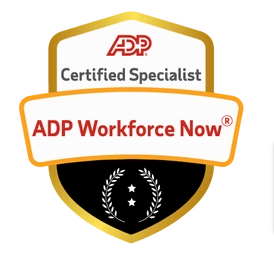
ADP is a leading payroll servicer that offers its own credentials for accountants and payroll specialists. Payroll specialists can pursue the Certified Payroll Specialist in ADP Workforce Now® certification to prove their knowledge of ADP software.
- Subjects covered: Time and attendance, payroll management, ADP Workforce Now® settings and navigation
- Eligibility requirements: Candidates need at least six months of professional experience using the ADP Workforce Now® software and have practitioner access. Candidates are encouraged to complete a practice exam and self-paced training course, but it’s not required.
- Registration: Candidates can register online via the ADP Education website. The exam is available online at any time and any date after purchasing it.
- Retake options: ADP requires candidates to wait at least 90 days before retaking the exam.
- Recertification requirements: This certification is valid for three years after the testing date.
- College credit: Certified candidates do not automatically qualify for college credit, but colleges and universities may choose to approve the certification for credit.
Employers more often request that their payroll specialists earn this certification rather than candidates pursuing it on their own. However, payroll specialists might choose this certification if they’re just beginning their careers and want to highlight their skills for an employer working mostly with ADP software.
FPC: Fundamental Payroll Certification
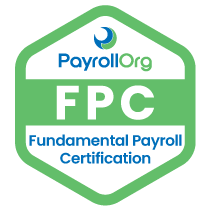
The Fundamental Payroll Certification (FPC) from PayrollOrg tests payroll competencies for beginner to advanced payroll specialists. The FPC is one of the most well-known credentials for payroll professionals.
- Subjects covered: Fair Labor Standards Act (FLSA), professional responsibility, record retention, global compliance, compensation and benefits, payroll deductions, business continuity plans, internal auditing procedures, payroll journal entries
- Eligibility requirements: FPC does not require candidates to have payroll experience or educational prerequisites, but candidates must download and read the FPC handbook.
- Registration: The FPC exam is offered twice a year in the fall and spring. Candidates must complete an online application for approval before registering for the exam online during the registration windows, which typically last 4-5 months.
- Exam format: The FPC exam includes 150 multiple-choice questions, which test-takers must complete within three hours. The exam is available online via OnVUE, which uses an online proctoring system for monitoring test-takers.
- Retake options: Although PayrollOrg allows retakes for the FPC exam, candidates must wait until the next testing window to retake the exam.
- Recertification requirements: The FPC credential is valid for three years, after which a candidate must recertify their certification. Candidates can either earn at least 60 recertification credit hours (RCHs) before their recertification period ends or take a recertification exam during the last year of their recertification period to renew FPC.
- College credit: Taking the FPC exam qualifies candidates for eight semester hours through the American Council on Education’s College Credit Recommendation Service (CREDIT). Additionally, candidates participating in PayrollOrg’s FPC Bootcamp can earn another four semester hours. However, not all colleges and universities may accept these credits.
PayrollOrg offers study materials, like web-based training and books, and online training courses to help candidates study for the FPC exam. Passing FPC candidates receive a digital badge to showcase their credential.
Despite being open to beginner payroll specialists, the FPC exam covers comprehensive ground on virtually every aspect of payroll, from compliance to payroll cost management. FPC is highly recognizable by employers because it helps identify candidates who are knowledgeable in multiple payroll disciplines.
Payroll Certification from the National Association of Certified Public Bookkeepers (NACPB)
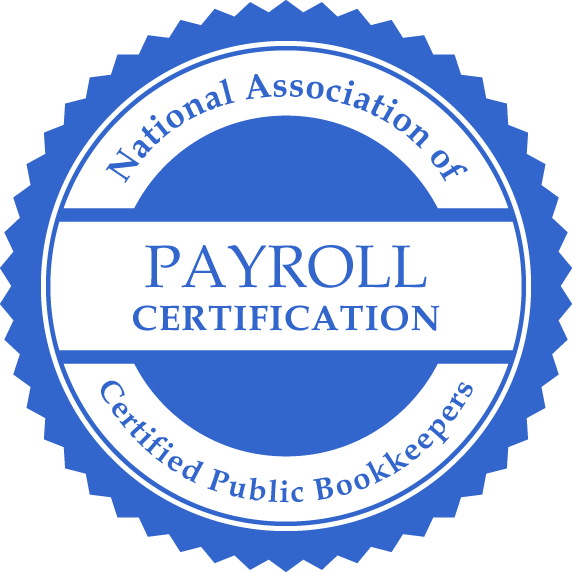
The NACPB offers and maintains the Payroll Certification credential, a nationally recognized certification requiring the completion of a course and exam.
- Subjects covered: Employee net pay and payment methods, gross pay computations, payroll practices, using payroll software and services
- Eligibility requirements: Candidates must take and pass a NACPB-approved Payroll Fundamentals course before registering for the exam.
- Registration: NACPB offers the Payroll Certification Exam online via its online testing center. Candidates can purchase an exam at any time, but they must complete it within one year from the date of purchase.
- Exam format: Candidates have two hours to complete the NACPB’s open-book Payroll Certification Exam, which includes 50 multiple-choice questions and simulations.
- Retake options: The NACPB allows candidates to retake the exam at any time without restrictions. However, they must purchase another exam for each retake.
- Recertification requirements: The NACPB Payroll Certification doesn’t expire, so certified candidates do not need to meet additional requirements to maintain their credential.
- College credit: This certification does not typically count for college credit. However, some colleges and universities may offer credit for the Payroll Fundamentals training course.
The Payroll Fundamentals course offers self-paced training over seven weeks to help prepare for the exam. Candidates have access to the course for six months after purchasing it. Those who take the course and pass the exam are eligible to use the official Payroll Certification logo.
This credential is especially beneficial for bookkeepers who want to set themselves apart from others when applying for jobs or seeking clients. Completing the required coursework can also help boost foundational skills necessary for beginner to intermediate bookkeeping work.
CPS: Certified Payroll Specialist
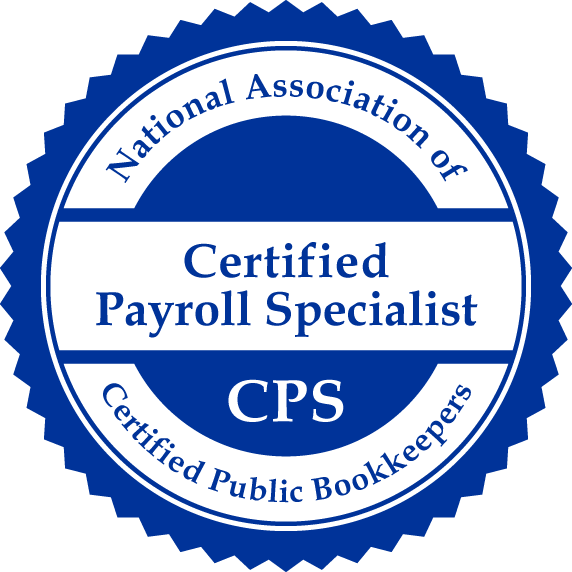
Also from the NACPB is the Certified Payroll Specialist credential, which designates candidates with thorough knowledge of payroll services, compliance, and management and expertise using QuickBooks Online. This certification combines the Payroll Certification and the QuickBooks Online Certification into one credential.
- Subjects covered: Payroll forms and procedures, payroll taxes and labor planning for employers, QuickBooks Online navigation and settings, managing employees and payroll with QuickBooks Online
- Eligibility requirements: Candidates must complete all requirements to earn the Payroll Certification and QuickBooks Online Certification from NACPB, including completing approved coursework and passing both exams. They also need at least one year of professional payroll experience and must agree to abide by the CPS Professional Code of Conduct.
- Registration: Candidates can purchase an exam bundle to complete the coursework and exams for each required certification on their schedule. Each exam must be passed within one year after purchase.
- Recertification requirements: The CPS license must be renewed each year for $25 with an included application. License holders also must complete at least 16 hours of continuing professional education (CPE) annually.
- College credit: Although this license doesn’t award college credit, some schools may approve it for equivalent credit toward a degree or certification.
Because the CPS license combines two certifications, it doesn’t have its own exam and coursework. Instead, candidates can complete the coursework and exams for the QuickBooks Online Certification and Payroll Certification together or separately to move on to applying for a CPS license.
Review the requirements for the Payroll Certification above. The QuickBooks Online Certification requires a pre- and post-assessment test, a fundamentals course, and a passed exam consisting of 50 multiple-choice questions and simulations.
The CPS license is an excellent option for payroll specialists for small to medium-sized businesses who may perform several bookkeeping and accounting duties in addition to payroll. Employers using QuickBooks Online may also prefer payroll specialists with this credential.
CPP: Certified Payroll Professional
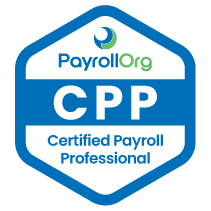
The Certified Payroll Professional credential from PayrollOrg is for those with professional payroll experience to showcase their skills in advanced payroll concepts. This credential has some of the strictest requirements, but it’s also highly sought after by employers seeking candidates who are serious about their specialty.
- Subjects covered: Employment taxes and benefits, multi-state taxation and reporting, voluntary deductions, maintaining master file components, staffing competencies, internal controls, accounting principles
- Eligibility requirements: Candidates must meet one of three sets of criteria, as explained in detail below, before they can sit for the CPP exam.
- Registration: The CPP exam is offered twice a year in the spring and fall. Candidates can register online during open windows from November to April for the spring exam and July to October for the fall exam.
- Exam format: Test-takers have up to four hours to complete the CPP exam, which includes 190 questions.
- Retake options: Candidates must wait until the next testing window to retake an exam unless they complete a PayrollOrg training program in person at the Las Vegas training center.
- Recertification requirements: The CPP remains valid for five years after passing the exam. Candidates need 120 RCHs before their recertification ends, or they can take a recertification exam to maintain their credential.
- College credit: The CPP exam is worth 10 semester hours from the American Council on Education’s College Credit Recommendation Service. Candidates completing a CPP Bootcamp can earn another six semester hours. However, it’s up to each school to accept those hours for credit.
Anyone interested in pursuing the CPP must fall into one of the following buckets:
- Have at least three years of experience within the past five years prior to applying for the exam in a professional role relevant to payroll, including payroll education and training, payroll administration, or payroll taxation and accounting.
- Have at least one year of professional experience in at least one of the above areas within the past two years. Plus, the candidate must have completed a group of PayrollOrg courses, another certification, or the CPP Bootcamp within the past 24 months.
- Have at least 18 months of professional experience in at least one of the defined areas above, hold an FPC credential, and have completed a group of PayrollOrg courses, the CPP Bootcamp, or the Payroll Administration Certificate Program within the last 18 months.
The FPP’s strict criteria for exam candidates ensure that only current payroll professionals obtain the credential. Therefore, the FPP is best for people looking to advance their careers and stand out to employers.
Do You Need a Payroll Certification?
Payroll certifications are voluntary in the sense that you don’t need to earn one to practice payroll tasks in the industry. However, many employers seek candidates who set themselves apart from the pack in some way—often, that way is through a certification or license.
So, although they’re not technically needed, a payroll certification can certainly help you find employment or advance your career. As you gain professional experience, I suggest considering the CPS or CPP, which designate payroll specialists with an excellent grasp of all payroll concepts, from taxation to compliance.




